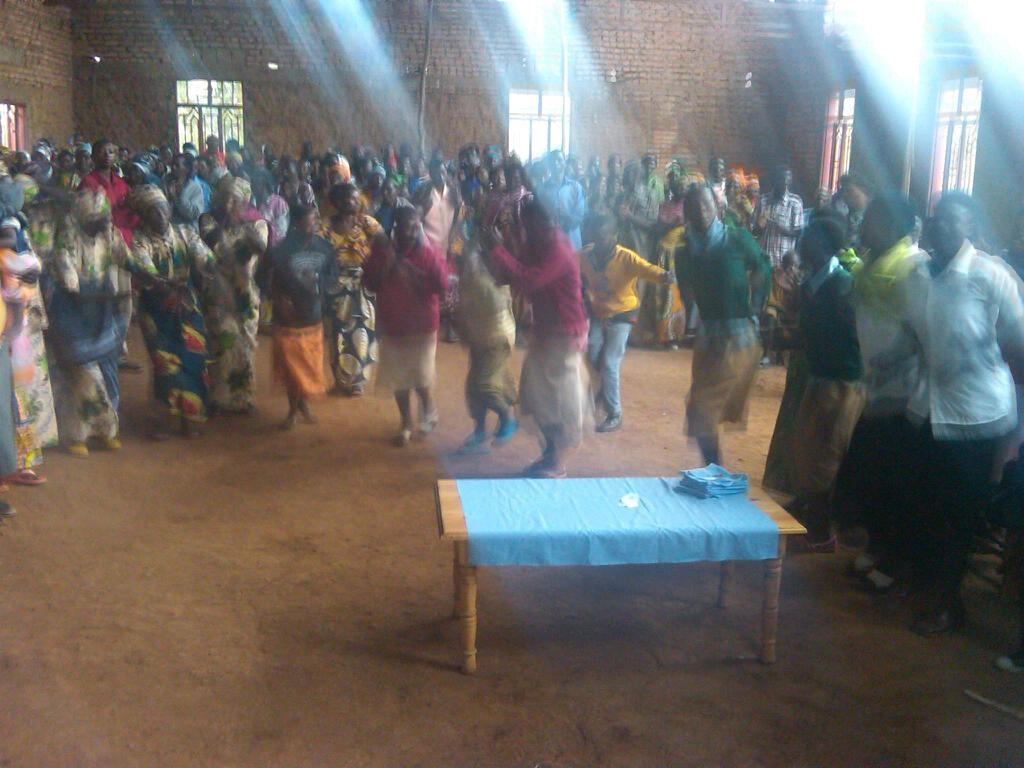January 12, 2012, 5:02 EST – Kigali, Rwanda
 Today was a wonderful day. I had a chance to visit two Anglican parishes where we met with members of our savings groups. One parish was in downtown Kigali, and the other one was about one hour away from downtown. It was so encouraging to meet the group members and hear their stories. It was also a nice opportunity to get to know our staff better. Chris Ordway and I traveled with Marie Jeanne, our lead trainer for our Anglican Church program; Kayira, our field coordinator for the Kigali diocese; and Panina, who is the director of programs for the Anglican Church in Kigali.
Today was a wonderful day. I had a chance to visit two Anglican parishes where we met with members of our savings groups. One parish was in downtown Kigali, and the other one was about one hour away from downtown. It was so encouraging to meet the group members and hear their stories. It was also a nice opportunity to get to know our staff better. Chris Ordway and I traveled with Marie Jeanne, our lead trainer for our Anglican Church program; Kayira, our field coordinator for the Kigali diocese; and Panina, who is the director of programs for the Anglican Church in Kigali.
The stories that the group leaders shared with us were very inspiring. They described the process of how HOPE’s savings group methodology is impacting their lives over a multi-year time period. The pattern varies by group but goes something like this:
– The group is formed, typically consisting of 15-20 members of the community looking to lift themselves out of poverty. The group gets initial training from HOPE and our church partner to understand best practices on how to organize and manage the group.
– The group members begin saving, usually at levels that seem incredibly small. But they are beginning to build solidarity and confidence among the group. A typical starting savings amount is 100 Rwandan francs per week, which is about 15 cents per group member per week. Along the way, the group receives biblically based business training from our staff members to equip them to be stronger businesspeople.
– As they invest more time and energy into cultivating their businesses, the amount that they are able to save begins to increase, from 15 cents per week to 30 cents, then 60 cents, and so on. At this stage, the group uses the savings to take care of family essentials, such as adequate shoes and nutritious meals.
– Once these essentials are in place, the group begins to generate enough funds to fund the purchase of assets. One group started by buying a single goat. Another bought a sewing machine to help its members be more efficient seamstresses.
– Things continue to develop, and the group’s assets grow. One musically-inclined group bought musical instruments, and now makes an ongoing source of income by playing weddings and concerts in the village. Another purchased a car, and they rent the car to others in the village. Some of the groups have saved so much that they opened a group savings account with a local bank. The group leaders proudly showed us their bank passbooks which in two cases have a balance of over one million Rwandan francs (over $15,000)!
– At the same time, the group members are doing more and more to benefit their families. Some groups are able to afford schooling for their children for the first time. Others can now purchase health insurance.
– And most importantly, their spiritual lives are being transformed. They are becoming more actively involved in the Church and using their prosperity to increase tithing and support for the church. One group is in the process of building a storefront which they will rent out to local businesses. They will let the church use part of the storefront rent-free!
– Finally, some of the members of the older, more established groups serve as mentors for the groups that are just getting started or struggling to get going. This is how transformation of families expands to transformed communities.
It was so encouraging to hear their stories, and I can’t wait to visit more of our savings groups tomorrow. We will be traveling to Byumba, about 90 minutes outside of Kigali. I’ll have more to report then!
















I’m really enjoying the series and am very grateful for you sharing your on-the-ground experiences.